Three-and-a-half years on from the Brexit referendum, we are still in the dark as to how or if the United Kingdom will leave the European Union.
It was supposed to be 29th March 2019, and then it was pushed back to early April and now, with another deadline looming on 31st October 2019, no one knows what will happen.
All the while, the Conservative Party in the UK has changed prime ministers and lost its majority in a general election. MPs have also been prevented from conducting parliamentary work for five weeks as Boris Johnson suspends them from sitting in the House of Commons.
Meanwhile, a new European Parliament – with British MEPs – has been in place since July, and on 1st November, a new European Commission will take office. Brexit chief negotiator Michel Barnier will continue in his post, however, and he joined the European Parliament debate on the crisis today with GUE/NGL MEPs.
For the Left in the Parliament, the issues of citizens’ rights, the Irish peace process and Gibraltar were the key issues, as said by co-leader Martin Schirdewan.
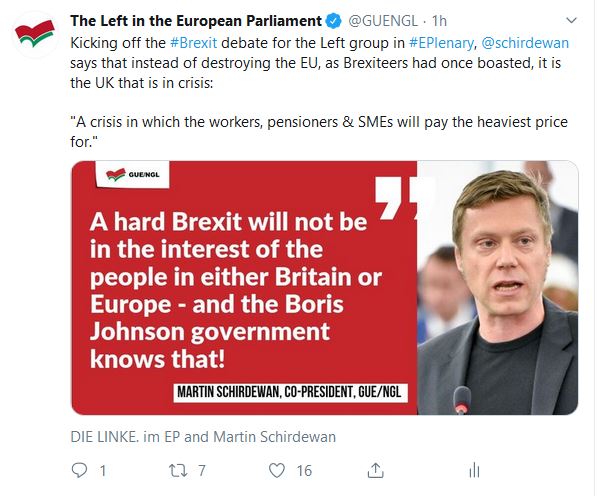
Six weeks to go….
With six weeks to go, the key issues to be resolved in the Withdrawal Agreement between the UK and the EU remain thus:
– Citizens’ Rights (the rights of EU nationals living in Britain and of British citizens living in the EU at the time of withdrawal)
– the border in Ireland (upholding the Good Friday Agreement and ensuring no hardening of the border)
– the Financial Settlement (a settling of accounts between Britain and the EU, based on existing commitments)
– other separation issues (eg. Gibraltar, governance, Euratom, functioning of agencies, data protection, intellectual property rights, ongoing cooperation in judicial matters, ongoing public procurement procedures…)
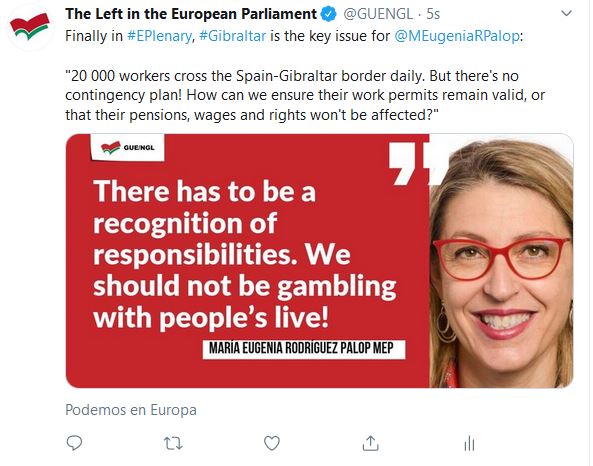
These issues would have to be resolved before negotiations could begin on the future relationship.
The draft Withdrawal Agreement and political declaration were agreed in November 2018 but the Withdrawal Agreement has not yet been ratified by the British parliament. There is no legal requirement for the British parliament to ratify the political agreement, but from the beginning the British government have deliberately tried to confuse the two documents.
For GUE/NGL, as part of the European Parliament’s Brexit Steering Group, our key issues include:
1) Citizens’ Rights
The Withdrawal Agreement does not deal with the rights of people who move between Britain and the EU after Britain leaves the EU, only those who have moved before that date (or before the end of the transition period, during which time Britain will continue to follow EU law).

EU nationals living in Britain at the time of withdrawal from the EU will maintain many rights that they have as EU nationals living in another EU member state.
There are a number of problems which it will not now be possible to deal with in advance of Brexit. EU nationals in Britain will have:
– no right to be joined by future spouses
– no family reunification (dependent siblings, cousins, aunts, uncles, future spouses and future children of future relationships…)
– no automatic right to permanent residence after 5 years
– no right to return to Britain after 5 years away
– no recognition of “home title” professional qualifications
– no protection from deportation for offenders who do not pose a risk to public security
– possible ethnic and racial profiling in accessing employment and services
In addition, there are a number of more administrative concerns with regard to the “settled status” being put in place by the British government
British people living in EU27 member states will lose their right to onward free movement to other member states. In addition, some member states will remove their right to vote in local elections, and they will have to undergo new registration processes in the member state in which they are living.
2) Ireland
Instead of agreeing to the Commission proposal for a “backstop” unique to the North of Ireland (ongoing membership of the EU Customs Union and parts of the Internal Market relating to goods), the British government sought – and secured – a “UK-wide” backstop.
The backstop includes a range of “level playing-field” provisions (eg. in the field of labour/social rights, environment and consumer protections, countering tax evasion and tax avoidance…)
The intent of the backstop is that:
– either the agreement on the future relationship effectively includes a Customs Union and ongoing non-regression of regulations, thus ensuring that there are no restrictions on the movement of goods across the border in Ireland
– or that the future relationship involves less alignment of Britain with the EU, in which case those aspects of the backstop specific to the North of Ireland remain in place
Many of the “level playing field” provisions are based on “non-regression” (with regard to existing EU standards). This potentially leads to regulatory divergence in Ireland in future years.
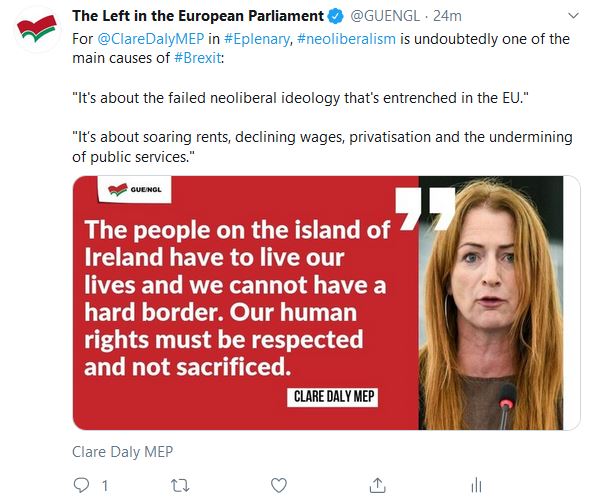
There are a number of additional concerns concerning the protocol on Ireland:
– services are not included, which is damaging to the all-island economy
– There is a very restrictive interpretation of “no diminution of rights” which was promised in the Joint Report in December 2017. The Parliament in its resolution in March is clear that this should cover social rights and democratic rights;
– The mechanism for implementation and enforcement is weak.
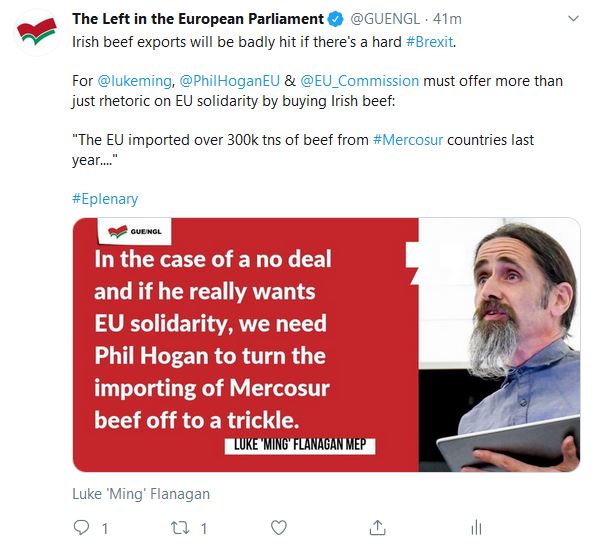
Boris Johnson
However, since Boris Johnson became prime minister, the British government have explicitly gone back on a number of their commitments:
– they are clear that they want to diverge from EU regulatory standards (eg. in environmental standards, consumer protections, employment rights…)
– they want to get rid of the backstop
The EU have been open to new ideas on the backstop if they meet the same objectives (uphold the Good Friday Agreement, protect the all-island economy and north-south cooperation, ensure that there is no infrastructure on the border).
The only objective the British government agrees with is to avoid physical infrastructure on the border. They do not want to discuss North-South cooperation or the all-island economy.
As we approach another potential cliff edge, GUE/NGL will maintain its position in always prioritising citizens’ rights and the prevention of a border in Ireland.
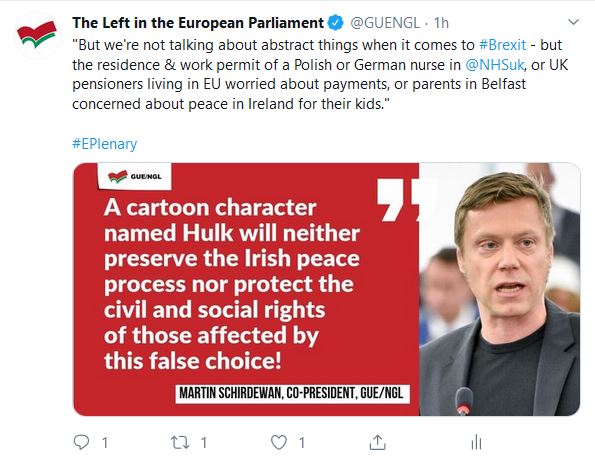
The current British government have shown that they cannot be relied upon to implement the Withdrawal Agreement provisions on citizens’ rights in good faith.
On Ireland, 1.8 million people who are entitled to Irish (and therefore EU) citizenship live in the North of Ireland. They are being taken out of the EU against the wishes of the clear majority.
The Withdrawal Agreement (with the backstop) provides the bare minimum protection necessary for the Good Friday Agreement (although, even with the Withdrawal Agreement, Brexit will still be damaging to Ireland – and in particular to the North of Ireland).
But even if the Withdrawal Agreement is accepted by the British then there will still be a lot of issues to resolve, including the rights of Irish/EU citizens born in the North of Ireland and cross-border issues which are not covered by the Agreement.
Irish reunification
The Good Friday Agreement provides for a solution – a referendum on Irish reunification.
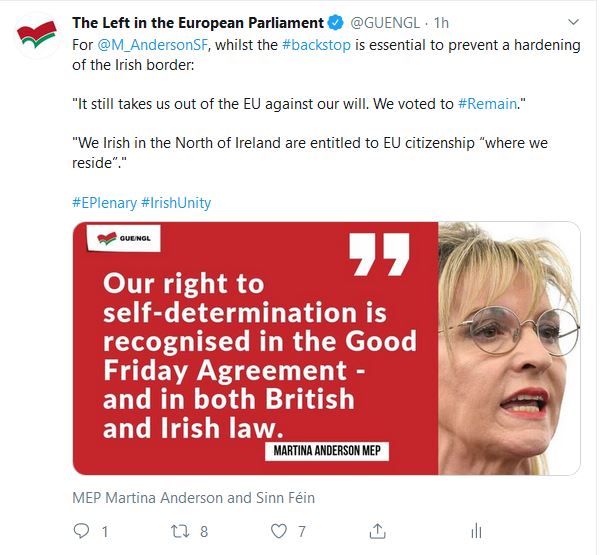
The European Council stated on 29 April 2017 that: “the Good Friday Agreement expressly provides for an agreed mechanism whereby a united Ireland may be brought about through peaceful and democratic means; and in this regard, the European Council acknowledges that, in accordance with international law, the entire territory of such a united Ireland would thus be part of the EU.”
Similarly, it is not up to the EU, but the EU would have an important role to play in encouraging Britain to live up to its obligations under the Good Friday Agreement and to have a referendum on Irish reunification.
Irish reunification offers a means to respect British red lines and EU principles.
If we are going into a no deal situation then the issue becomes more urgent.
Photo courtesy of Garry Knight on Flickr
Related Meps
Luke ‘Ming’ Flanagan
Luke ‘Ming’ Flanagan – Independent
Martin Schirdewan
DIE LINKE.
